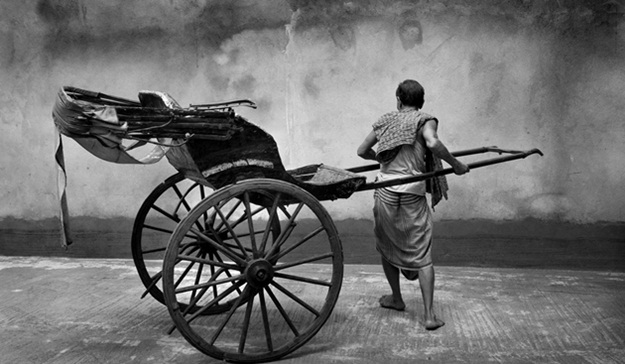 |
| Since the end of the 19th century, hand-pulled rickshaws have been plying the streets of Kolkata. They have witnessed to and remained an integral part of Kolkata’s socio-economic evolution for over 100 years...
Trading for Bread…
The responsibility
no longer seems a burden to him
It’s love for the people of this
soil,
and his family that he runs,
With burnt soles, blood-oozing toes,
Hands steeled on handles,
Skin blind to rain
and dust, he moves on.
The mouths of his children are
hungry, raw.
So, no green fields, no blue skies-
No leisure for him.
In his courtyard trees don’t flower,
Smoke rises from the hut on his
return.
A row of small girls waits at home
with their mother.
They hold him tight for fear of losing…
Fed by work-bent mother at night,the
family
plops onto the bed. This is another path
where all living beings enter
unwittingly,
They dream luxuriously till the
morning sets in again,
….Revealing, stretching another steamy open space
For one more day …
No pity, no patience!
Having enough sleep or eat is not important for the bread-winner
So is self-annihilation that scars
His flesh, bones, heart, guts and
intestines….
There’s no escape.
Taking the vast light on his
shoulders, the rickshaw-puller
Wakes up from an undersized sleep,
and edges away again
…slowly slowly, towards the outermost
road…
The spirit will linger, I know, the
trips will continue-
Twisting turning roasting charring
burning
The two sagging legs will keep
rolling
on the by lanes of the city.
Bent, breathless, stone-deaf to
shaming policies, he’ll run
In the end, sometime, somewhere far…
heaving, lurching across the steep path; fatigued,
In the unquenchable thirst of rest
… this pair of feet will die a death; a dry, brutal death
Media, NGOs will hog the limelight...
I'll bear the city-shame.
Kolkata's emblematic two-wheeled
contraption has been a long-standing symbol of oppression. With the
government's proposal to phase out these manual rickshaw, a part of the city's
history, rather a part of its colonial vestige, will be deleted forever. Yet
for a city that is desperately trying to grab on to the idea of a better, new
world, it would have to take human development into account. However, while
there is no denying the inhuman nature of a rickshaw puller's job, the men need
to be assured of a livelihood once their current means is denied to them…..
Written for Susan's Prompt. Trade.
|
Thursday, May 03, 2018
Trading For Bread~
Subscribe to:
Post Comments (Atom)
"They dream luxuriously till the morning sets in again,
ReplyDelete….Revealing, stretching another steamy open space
For one more day …
No pity, no patience!"
The trade off is inhuman, but so is starvation. What a parent will do for family never ceases to amaze me. You move me, too, with the plight of the rickshaw man and his rubbery legs. I think you've depicted this plight before, but this time, you give him--them--the respite of dreams. So totally human.
I am glad you reminded us that many people lead lives like this, trying to keep their families fed. How chest-bursting it must be, to run and run all day long, as one grows older. An important poem, a reminder of the reality of so many.
ReplyDeleteIt is a pity they can't convert to trishaws instead, which are so much less arduous. What will they and their families do without this income?
ReplyDeleteMy dad was fond of saying, "Life is a series of trade-offs." Moving from a demeaning job to one that offers dignity seems to be a good trade-off, but only if such a step up is available.
ReplyDeleteThank you for sharing this journey of Rickhaw-puller. The next stage of his journey will be adjusting to change when the rickshaw is phased out
ReplyDeleteMuch🌼love
With burnt soles, blood-oozing toes,
ReplyDeleteHands steeled on handles,
Skin blind to rain and dust, he moves on.
Perfect description of the hardships of the rickshaw-pullers.
Hank